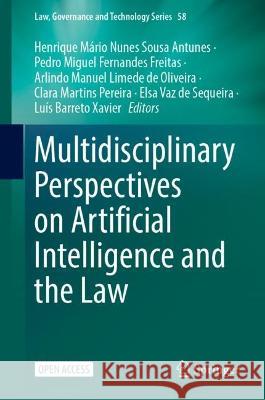Multidisciplinary Perspectives on Artificial Intelligence and the Law » książka



Multidisciplinary Perspectives on Artificial Intelligence and the Law
ISBN-13: 9783031412639 / Angielski
Multidisciplinary Perspectives on Artificial Intelligence and the Law
ISBN-13: 9783031412639 / Angielski
(netto: 191,66 VAT: 5%)
Najniższa cena z 30 dni: 192,74
ok. 16-18 dni roboczych.
Darmowa dostawa!
Part I Scientific, technological and societal achievements in Artificial Intelligence.- Introduction to Part I.- 1. Artificial intelligence: historical context and state of the art.- 2. The impact of language technologies in the legal domain.- 3. Societal implications of recommendation systems: a technical perspective.- 4. Data-driven approaches in healthcare: challenges and emerging trends.- 5. Security and privacy.- Part II. Ethical and legal challenges in Artificial Intelligence.- Introduction to Part II.- 1. Before and beyond Artificial Intelligence: opportunities and challenges.- 2. Autonomous and intelligent robots: social, legal and ethical issues.- 3. The ethical and legal challenges of recommender systems driven by Artificial Intelligence.- 4. Metacognition, accountability and legal personhood of AI.- 5. Artificial Intelligence and decision-making in health: risks and opportunities.- 6. The autonomous AI physician: medical ethics and legal liability.- 7. Ethical challenges of Artificial Intelligence in medicine and the triple semantic dimensions of algorithmic opacity with its repercussions to patient consent and medical liability.- Part III. The law, governance and regulation of Artificial Intelligence.- Introduction to Part III.- 1. Dismantling four myths in AI & EU Law through legal information ‘about’ reality.- 2. AI modelling of counterfactual thinking for judicial reasoning and governance of law.- 3. Judicial decision-making in the age of Artificial Intelligence.- 4. Liability for AI driven systems.- 5. Risks associated with the use of natural language generation: a Swiss civil liability law perspective.- 6. AI Instruments for risk of recidivism prediction and the possibility of criminal adjudication deprived of personal moral recognition standards – sparse notes from a layman.- 7. The relevance of deepfakes in the administration of criminal justice.- 8. Antitrust law and coordination through Al-based pricing technologies.- 9. The “Artificial Intelligence Act” proposal on European e-Justice domains through the lens of user-focused, user-friendly and effective judicial protection principles.- 10. The European Union’s approach to Artificial Intelligence and the challenge of financial systemic risk.- 11. Regulating AI: challenges and the way forward through regulatory sandboxes.
Arlindo Oliveira obtained a BSc in EECS from Instituto Superior Técnico (IST) and a PhD from the University of California at Berkeley. He was a researcher at CERN, the Electronics Research Laboratory of UC Berkeley, and the Berkeley Cadence Laboratories. He is a distinguished professor of IST, president of INESC, member of the board of Caixa Geral de Depósitos and a researcher at INESC-ID. He authored several books and articles in the areas of algorithms, artificial intelligence, machine learning, bioinformatics, and computer architecture. He is a member of the Portuguese Academy of Engineering and a past president of IST, of INESC-ID, and of the Portuguese Association for Artificial Intelligence.
Clara Martins Pereira is Assistant Professor at Durham Law School. She is also Departmental Lecturer at Oxford Law Faculty and Invited Professor at Católica Lisbon School of Law. Clara holds a DPhil, an MPhil, and a Magister Juris from the University of Oxford, as well as an MSc in Law and Business and an LLB in Law from Católica Lisbon School of Law. Her research lies at the intersection of financial law and regulation, technological innovation, and sustainability. In addition to her academic work, Clara has also been working as a consultant for various international organisations including the World Bank and ICF.
Elsa Vaz de Sequeira is a Professor at Universidade Católica Portuguesa, Faculty of Law. She is the coordinator of the Lisbon Section of the Católica Research Centre for the Future of Law (CRCFL) and a co-editor of the Católica Law Review. She integrates the executive committee of the working group on Law and Artificial Intelligence. She was a legal advisor at the Ministry of Culture´s office. She teaches and develops research in private law, namely foundations of civil law and contract law. She has published books and articles on different issues of civil law, namely on civil liability, collision of rights, and co-ownership of rights.
Luís Barreto Xavier is an Invited Professor at Universidade Católica Portuguesa, Faculty of Law, in Lisbon, and an Of Counsel at Abreu Advogados. He was a senior consultant at the Prime Minister Legal Centre (CEJUR) and a legal clerk for a Constitutional Court Judge. At Católica, he founded and directed (2009-2018) a new unit, dedicated to international teaching and research: the Católica Global School of Law. His areas of expertise are Private International Law and Digital Law. He belongs to the executive committee of the working group on Law and Artificial Intelligence. Since 2019, he teaches a course on the Law of AI for undergraduate students. He is currently the President of the Knowledge Institute of Abreu Advogados.
This open access book presents an interdisciplinary, multi-authored, edited collection of chapters on Artificial Intelligence (‘AI’) and the Law. AI technology has come to play a central role in the modern data economy. Through a combination of increased computing power, the growing availability of data and the advancement of algorithms, AI has now become an umbrella term for some of the most transformational technological breakthroughs of this age. The importance of AI stems from both the opportunities that it offers and the challenges that it entails. While AI applications hold the promise of economic growth and efficiency gains, they also create significant risks and uncertainty. The potential and perils of AI have thus come to dominate modern discussions of technology and ethics – and although AI was initially allowed to largely develop without guidelines or rules, few would deny that the law is set to play a fundamental role in shaping the future of AI.
1997-2026 DolnySlask.com Agencja Internetowa
KrainaKsiazek.PL - Księgarnia Internetowa









